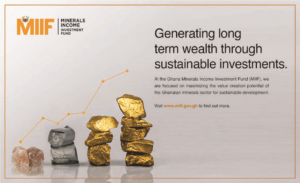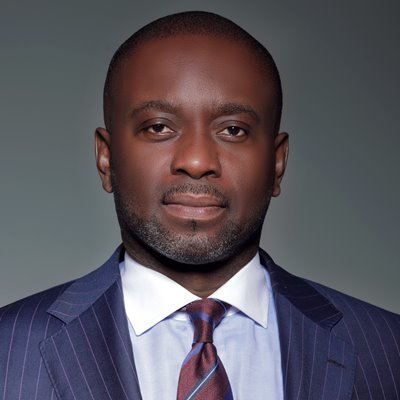It’s past midday in the bustling capital city of Ghana and on the first floor of one of the glassed-up buildings in one of Africa’s swankiest corporate addresses, CEO Edward Nana Yaw Koranteng discusses the strategic thrust of the Minerals Income Investment Fund (MIIF).
Before becoming Chief Executive of the Fund, Koranteng had traveled extensively as a corporate banker working in England and East Africa where he advised corporates and sovereign entities such as Shelter Afrique, Chase Bank of Kenya (now SBM Bank of Mauritius) on financing projects and sovereigns such as the Reserve Bank of Malawi. He is also a lawyer who has advised corporates and governments on large-scale infrastructural deals and debt financing so he is no stranger to the inner workings of money and how it can become an important leverage for countries. He says, “The mandate of the Fund is to manage the equity interest of Ghana in mining entities. We are also responsible for aggregating royalties that are paid by all licensed mining companies to the government of Ghana with the intent of investing to guarantee the future wealth of Ghanaians.”
At present, the largest percentage of royalties comes from gold. This is not surprising since, at the time of writing this article, Ghana is the largest producer of gold in Africa with gold royalties representing 95% of royalties to the state. Gold production in Ghana is increasing through massive exploration projects, setting Ghana up to live up to its pre-independence name – the Gold Coast. MIIF however is acutely aware of the vast potential of other minerals like lithium and salt among some seventeen existing minerals whose upsides can contribute significantly to Ghana’s future wealth.
The Ada Songhor Salt project located in the Greater Accra region sits on 41,000 acres and when fully developed will become subSaharan Africa’s largest salt project. “The project is about twice the size of Walvis Bay in Namibia, which is currently the biggest in sub-Saharan Africa,” declares Koranteng. “With salt’s over 14,000 uses, from pharmaceuticals to textiles, manufacturing, food processing and oil and gas, this project has the potential to be revolutionary for Ghana’s economy. We are seeking to inject equity towards the development of this project because it speaks to our mineral diversification outlook and also because of the expansive value chain. The salt value chain covers the development and inputs needed for pharmaceutical, textiles, food processing, oil refineries, and fertilizer industries which is aligned to Ghana and the sub-region’s current industrialization plans.” Although current production of the Ada Songhor Salt is at 12% as of 2022, the company projects to produce 650,000 metric tons of high-grade salt of 99.9% in 2023 and 5,000,000 metric tons by 2028. The direct and indirect employment potential of the Ada Salt Project is in circa 10,000 with women being the prime beneficiaries.
Then there is Ghana’s discovery of lithium where again Koranteng’s leadership team is thinking big on the Electronic Vehicle (EV) market and how Ghana can move forward in the battery space while also using the by-products of lithium like feldspar to anchor a ceramics and fiberglass industry. MIIF is not only targeting the business side of the lithium market but also heralding a decarbonization agenda and the country’s objective of reducing carbon emissions. “We are seeking to invest heavily in lithium notonly as part of the decarbonization agenda but because this would be of strategic and security importance to Ghana. We are also looking at the electronic vehicle market and other inputs which shifts dependence from fossil fuels. The conversations around environmental, social, and governance (ESG) issues are extremely important to us and underpin our investments. We are about to invest in a company that has discovered lithium in economic quantities in Ghana. One of our strategies is to look at the value chain of lithium and its byproducts such as feldspar, silica, etc. Our plan is to develop an industry that not only covers processing, etc. but also creates other industrial eco-systems, from these by-products. Lithium is atransformative mineral for Ghana on many fronts,” Koranteng emphasized.
| “Our vision is to become Africa’s largest sovereign minerals fund. We have a five-year plan to increase our Assets Under Management (AUM) to over US$ 500 million by 2025.” |
While the potential of the transformative minerals excites the CEO, gold, traditionally the pillar of wealth for Ghana, leads MIIF’s core agenda. Koranteng has a three-pronged approach to creating more value and ensuring that Ghanaians benefit enormously from the wealth that is generated from gold mining. First, the Fund will continue to invest in gold. In 2022, MIIF acquired a 4.6% stake in Asante Gold Corporation, a Canadian, Ghanaian and German-listed exploration and mining company with all of its assets exclusively located in Ghana. Asante Gold owns the Bibiani Mensin Mines and has recently acquired the Chirano Mine which prior to acquisition belonged to Kinross, a leading Canadian mining outfit. The overall potential of the mineral resources in Asante Gold’s concession is thought to be more than US$2 billion over a mine life of about 20 years. “The plan is to systematically increase the equity interest of the state through MIIF so that the potential upside of the mines accrues to the state as well,” Koranteng asserts.
MINERALS INCOME INVESTMENT FUND (MIIF)
Secondly, MIIF sees gold mining support services as crucial to the value chain development of the precious metal. Everything from contract mining, fuel supplies, exploration services, and the construction of mining infrastructure are all areas that MIIF intends to support. According to Koranteng, “These service areas help retain wealth in the communities and also in the country. We need to support Ghanaian companies in mining hence we are seeking to invest in some entities which have very good operations, good setups, robust corporate governance, and are ready to incorporate ESG principles into their work.”
Thirdly and perhaps the most revolutionary approach to increasing the wealth from gold is what MIIF has christened the small-scale mining incubation program (SSMIP). “Small-scale mining accounts for about 40% of the gold that is mined in Ghana. This is circa US$2.1 billion. All of that is being done informally. Small-scale mining employs about 2.4 million people both directly and indirectly. It is the biggest employer, and even more than the cocoa sector, another high forex earner.” The overarching objective of SSMIP is to formalize the informal artisanal or small-scale mining sector by providing support covering ESG, corporate governance, assured market access, provision of mercury free machinery and The CEO is also looking to diversify the traditional mining workforce to keep up with the conversations around social equity and governance. “In line with our CSR agenda, we are looking to support more women in mining because the industry is quite skewed in terms of gender.” We have initiated a ‘women in mining program’ with the Pa Grant University of Mines and Technology in Ghana (UMAT) with a plan to provide scholarships to women in mining areas to enroll onto the program,” Koranteng says.
In creating wealth through its mandate, the Fund is seeking to develop the capital markets by encouraging all its investments to list on the Ghana Stock Exchange. “We are pleased that Asante is listed on the Ghana Stock Exchange and is one of the best performing. MIIF in helping to develop the capital markets is working on a gold backed ETF product which it intends to list on the Ghana Stock Exchange”. Koranteng emphasizes that, looking beyond gold is essentially diversifying investments into other minerals and investing into the value delivery systems of each single mineral. That extension should cover the capital markets, education and formalizing a small-scale artisanal mining sector which holds illegal mining and accelerate sustainable mining in Ghana. MIIF is about to pilot with 30 small-scale mining companies in 2023 and quickly build on the pilot to roll out for over 240 licensed small-scale mining companies.











